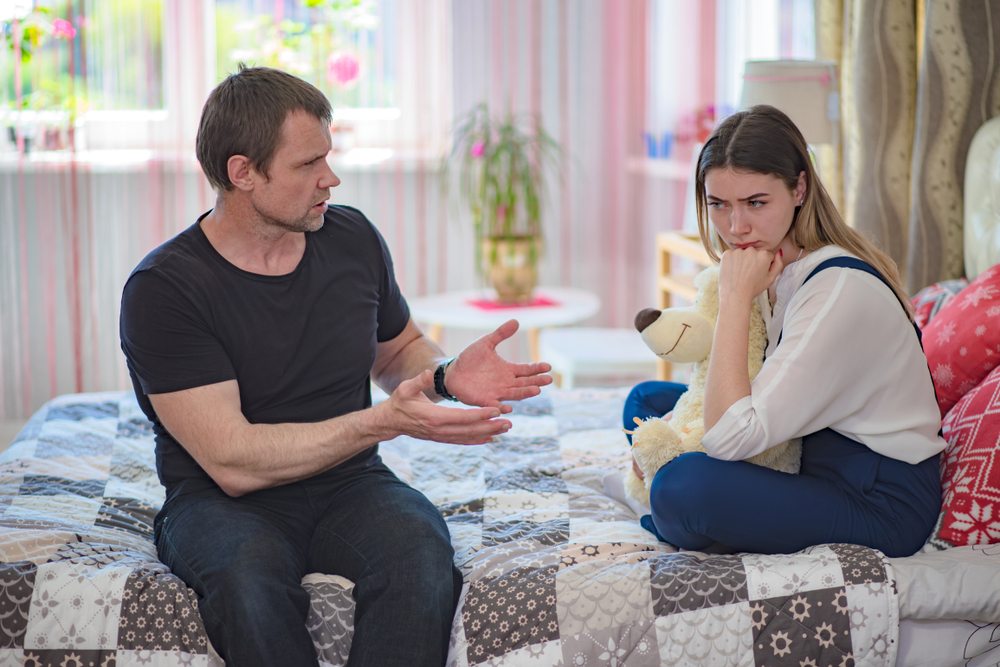Not all forms of toxic parenting are obvious. Many people grew up in homes where things seemed normal on the surface, but the words used by their parents told a different story. These words were not always loud, cruel, or aggressive. Sometimes, they were quiet and repetitive, wrapped in guilt or coated in sarcasm. Over time, these phrases shaped the way you viewed yourself, your emotions, and your worth. If you regularly heard certain things as a child, it may be a sign that your parents used control, guilt, and shame to influence your behavior. Here are seven familiar phrases that may have come from toxic and controlling parenting.
“Look What I Gave Up for You”

This type of comment is often meant to make you feel guilty, not loved. Instead of offering support or encouragement, it suggests that you owe your parent something for being born. When parents say this during arguments or disappointment, they are not communicating honestly. They are using guilt to shift the focus away from your feelings and onto their sacrifices.
This approach sends a damaging message. It tells you that your needs are less important than what your parent gave up. It also turns basic responsibilities, like providing care and love, into emotional debt. This creates a toxic dynamic where love feels conditional and self-expression feels selfish.
“You’re Always So Dramatic”

Being told that you are overreacting teaches you to distrust your emotions. This phrase is often used to avoid addressing a child’s real concerns. Instead of talking through what is wrong, the parent shuts it down by attacking the way the child feels. Over time, this leads to emotional confusion and shame.
Children who hear this often begin to bottle up their feelings, afraid of being mocked or dismissed. This emotional shutdown can carry into adulthood, making it difficult to handle conflict or express vulnerability. It also discourages self-awareness by framing emotional responses as flaws rather than natural reactions.
“Do It Because I Told You To”

While discipline is a normal part of parenting, using authority without explanation can be harmful. If a parent constantly refuses to explain their reasons, it sends the message that your voice does not matter. This shuts down communication and discourages healthy curiosity.
This kind of parenting uses fear to gain compliance rather than mutual understanding. Children raised this way may struggle to develop confidence in their own decisions. They are used to being told what to do without discussion, so they often doubt their judgment and hesitate to speak up later in life.
“I Can End This Whenever I Want”

Even when said jokingly, this phrase is rooted in fear. It is meant to remind the child that their security and safety depend entirely on the parent’s will. This turns a loving relationship into something threatening. Children need to feel safe and protected, not afraid of being abandoned or punished for mistakes.
Hearing something like this regularly creates insecurity. It sends the message that love or care can be withdrawn at any moment. That fear stays with people long after childhood, often showing up as anxiety in adult relationships. It makes it hard to trust others and feel secure in emotional bonds.
“You Better Be Grateful You Have Anything”

Some parents use this phrase to control their children through shame. Instead of teaching appreciation through kindness, they use guilt to keep their children quiet. While it is reasonable to teach children gratitude, doing so by using basic care as leverage is harmful.
This makes children feel like asking for anything is wrong. It teaches them that their needs are a burden. Many adults raised this way struggle with self-worth. They often feel undeserving of support or feel guilty for having preferences, even in healthy relationships.
“Stop Whining or I’ll Give You Something Real to Cry About”

This statement is both dismissive and threatening. It tells children that their pain is not valid, and worse, that expressing it could lead to punishment. This creates a fearful environment where emotions are seen as dangerous or embarrassing.
Children exposed to this kind of language often grow up suppressing their feelings. They may struggle with emotional release and have difficulty crying or expressing sadness, even in private. Emotional repression can lead to burnout, strained relationships, and poor mental health over time.
Read More: Living Without Close Family: What It’s Actually Like
“Why Can’t You Be Like Your Brother or Sister?”

Being compared to a sibling is incredibly damaging. It teaches a child that who they are is not good enough. It also creates tension between siblings, fostering resentment and competition instead of connection. Parents who use comparison often do so as a shortcut to control, rather than making an effort to understand their child’s unique needs.
Over time, this kind of comparison can cause lasting self-esteem issues. Children begin to shape their identity around someone else’s standards. They may become people-pleasers or perfectionists, constantly chasing approval that never feels earned.
What These Phrases Really Do

Many people dismiss these statements as common parenting lines. But when they are repeated over and over, especially during stressful moments, they do lasting damage. They undermine a child’s sense of safety, worth, and emotional intelligence. Children raised in this kind of environment often grow up feeling insecure, emotionally confused, or dependent on external approval.
These phrases condition children to believe they must earn love by behaving perfectly, hiding their feelings, or sacrificing their needs. They grow up second-guessing themselves, feeling responsible for others’ emotions, and struggling to trust people.
How to Know if This Applies to You

If any of these statements were part of your childhood, it is worth taking a closer look at the emotional environment you grew up in. Many people do not realize their upbringing was harmful because it looked fine from the outside. Toxic parents are often very good at appearing loving in public while using emotional manipulation at home.
You may have grown up thinking your parent was just strict or doing their best. That may be true in some cases, but intent does not erase impact. If you find yourself constantly blaming yourself, fearing conflict, or struggling to identify your own feelings, these patterns may trace back to your early home life.
What You Can Do About It

Acknowledging the problem is the first step. It is okay to question how you were raised. That does not make you ungrateful or disrespectful. It makes you self-aware. From there, you can begin the process of healing.
Start by learning to trust your emotions again. Give yourself permission to feel, without judgment. Practice setting small boundaries in your everyday life. If possible, seek support from others who understand what you are going through, whether in person or through books and online communities.
Rebuilding your self-worth takes time, but it is possible. You are allowed to exist without guilt. You do not have to carry emotional burdens that were never yours to begin with. You can learn to speak, feel, and choose freely, without fear of being punished for it.
Read More: Family Peacemakers Often Struggle with These Adult Patterns
Final Thoughts

Growing up with manipulative language creates deep emotional habits. But recognizing these phrases for what they are helps break the cycle. You do not have to keep believing the things you were told as a child. You have the power to rewrite that inner dialogue and build relationships based on honesty, respect, and emotional safety.
Disclaimer: This article was created with AI assistance and edited by a human for accuracy and clarity.
Disclaimer: This information is not intended to be a substitute for professional medical advice, diagnosis or treatment and is for information only. Always seek the advice of your physician or another qualified health provider with any questions about your medical condition and/or current medication. Do not disregard professional medical advice or delay seeking advice or treatment because of something you have read here.

